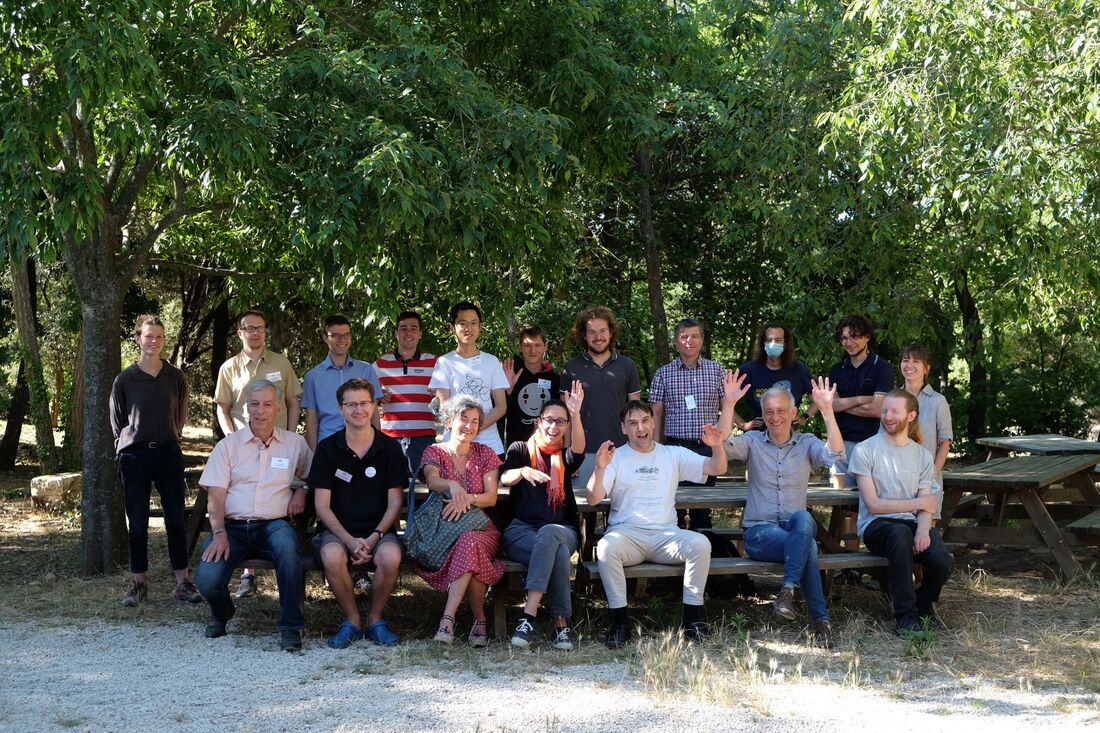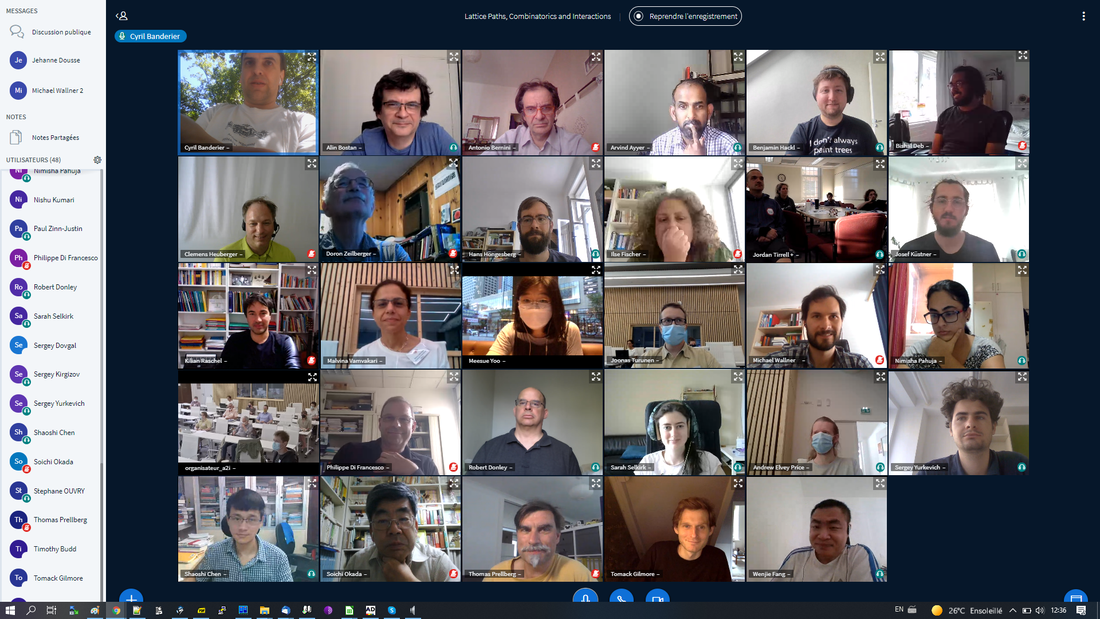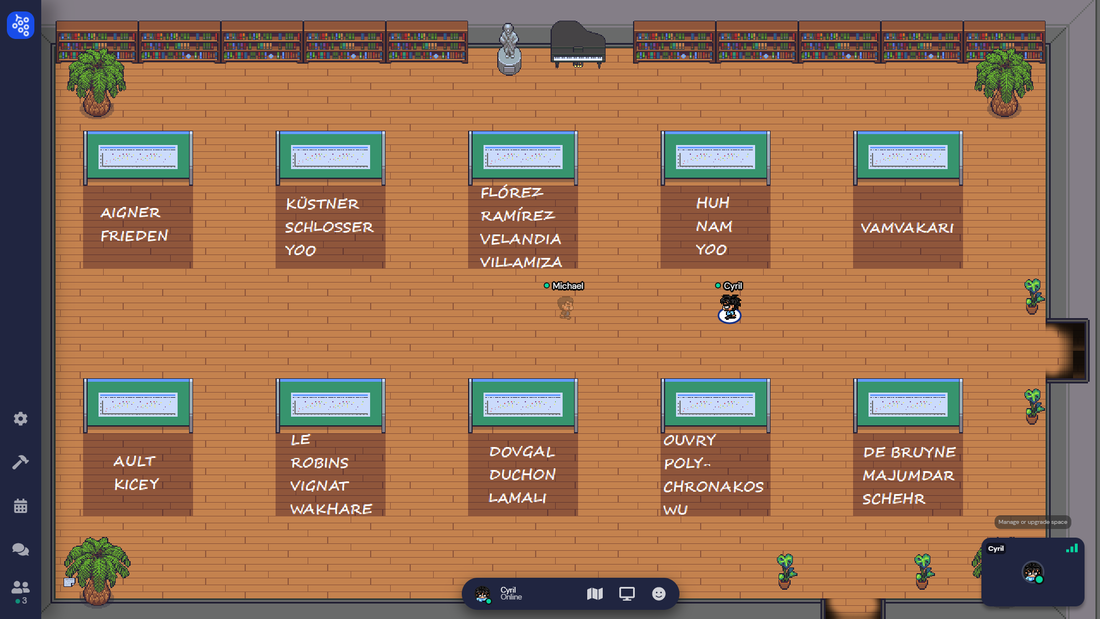|
Scientific & organizing committee
Comité scientifique et d’organisation Cyril Banderier (CNRS, Université Sorbonne Paris Nord) |
|
Lattice paths are fundamental objects that link a variety of fields of mathematics, computer science, and physics. The reason for their ubiquity is that they are well-suited to encode numerous objects (like random walks, continuous fractions, trees, planar maps, words, tilings…) and can reflect several aspects of these objects (q-analogues, critical exponents, conformal invariance, D-finiteness…). Thus, problems in various fields can be solved via the corresponding lattice path formulation.
Since lattice paths are — at the outset — reasonably simple combinatorial objects, the study of related probabilistic models is rich and attractive in its own right; this offers many formulas and challenging equations which are at the crossroads of several fields, forcing to develop new methods (like multivariate asymptotics, differential Galois theory, bijections, SLE, orthogonal polynomials, representation theory, heuristics from physics). In recent years, interest in research on lattice paths has intensified, as it spurred the investigation of intriguing problems at the interface of such diverse areas as enumerative combinatorics, algebraic combinatorics, computer algebra, asymptotic combinatorics, probability theory, combinatorial physics. The goal of this conference is to bring together leading researchers from these overlapping communities, to offer a panorama of discoveries made these last years. The main aim is to intensify the fruitful interactions between the researchers in these communities in order to make significant progress on the outstanding problems motivated by the combinatorics and analysis of lattice paths. This conference constitutes the 9th « International Conference on Lattice Path Combinatorics & Applications ». This series of conferences started in 1984 under the impulsion of Sri Gopal Mohanty. This year, the conference will consist of 18 long talks and a few shorter talks, leaving time for scientific discussions. More details on the history of the conference and on a post-conference special issue (where all attendees are welcome to submit their work) can be found on the International Conference on Lattice Path Combinatorics & Applications webpage. |
Les chemins sur réseau sont des objets fondamentaux qui apparaissent dans de nombreux champs des mathématiques, de l’informatique et de la physique. Cette ubiquité s’explique par leur capacité à coder des objets combinatoires divers (marches, arbres, cartes, mots, pavages, fractions continuées) et à en réfleter différentes facettes (q-analogues, exposants critiques, invariance conforme, D-finitude). De multiples problèmes peuvent ainsi être formulés et résolus en termes de tels chemins.
Les chemins sur réseau étant, de prime abord, une structure simple et naturelle, l’étude des modèles probabilistes afférents est riche et débouche sur des équations et des formules qui mènent à des défis pluridisciplinaires, forçant le développement de nouvelles méthodes (en asymptotique multivariée, théorie de Galois différentielle, bijections, polynômes orthogonaux, théorie des représentations, processus SLE, heuristiques issues de la physique). Ces dernières années, l’intéret pour ces objets a grandi et a mené à des problèmes intrigants, à l’interface de domaines variés, notamment en combinatoire énumérative, en combinatoire algébrique, en calcul formel, en combinatoire analytique, en théorie des probabilités, en physique combinatoire. L’objectif de cette conférence est de réunir des experts internationaux issus de ces communautés, d’offrir un panorama des nombreuses découvertes des dernières années, et d’intensifier les interactions entre ces communautés, afin d’aboutir à de nouveaux progrès sur des problèmes de premier plan trouvant leur source dans la combinatoire des chemins. Cet évènement constituera la neuvième session de la série « International Conference on Lattice Path Combinatorics & Applications », initiée par Sri Gopal Mohanty en 1984. Cette année, la conférence proposera 18 exposés longs et quelques exposés courts, laissant de surcroît du temps pour les échanges scientifiques. Pour plus de détails sur l’histoire de la conférence et sur un numéro spécial consacré aux thématiques de la conférence (où tous les participants pourront soumettre leur travail), on pourra se référer à la page International Conference on Lattice Path Combinatorics & Applications. |
George Andrews (Pennsylvania State University) Schmidt type partitions and partition analysis
Andrei Asinowski (Alpen-Adria-Universität Klagenfurt) Vectorial kernel method and lattice paths with patterns
Philippe Biane (CNRS, Université Paris-Est) Mating of discrete trees and walks in the quarter-plane
Alin Bostan (INRIA, Saclay) Lattice paths and computer algebra: D-finiteness and D-transcendence
Mireille Bousquet-Mélou (CNRS, Université de Bordeaux) Invariants for walks avoiding a quadrant
Timothy Budd (Radboud University) Winding of simple walks on the square lattice
Philippe Di Francesco (University of Illinois UC and IPhT Saclay) Triangular ice: combinatorics and limit shapes
Sergi Elizalde (Dartmouth College) Counting lattice paths by the number of crossings and major index
Ilse Fischer (University of Vienna) The alternating sign matrices/descending plane partitions relation: n+3 pairs of equivalent statistics
Ira Gessel (Brandeis University) Redundant generating functions in lattice path enumeration
Tony Guttmann (Melbourne University) Extracting asymptotics from series coefficients
Vadim Gorin (MIT) Addition of matrices at high temperature
Nina Holden (ETH, Zürich) Percolation on triangulations: a bijective path to Liouville quantum gravity
Mourad E.H. Ismail (University of Central Florida) Orthogonal polynomials, moments, and continued fractions
Satya Majumdar (CNRS, Université Paris Sud) Nonintersecting Brownian bridges in the flat-to-flat geometry
Olya Mandelshtam (University of Waterloo) A Markov chain on tableaux that projects to a multispecies totally asymmetric zero range process
Irène Marcovici (Université de Lorraine) Bijections between walks inside a triangular domain and Motzkin paths of bounded amplitude
Stephen Melczer (University of Pennsylvania) Lattice walks and analytic combinatorics in several variables
Robin Pemantle (University of Pennsylvania) Generating function technologies: applications to lattice paths
Bruno Salvy (INRIA / ENS Lyon) Computation of tight enclosures for Laplacian eigenvalues
Michael Singer (North Carolina State University) Differentially algebraic generating series for walks in the quarter plane
Perla Sousi (University of Cambridge) The uniform spanning tree in 4 dimensions
Andrea Sportiello (CNRS, Université Paris Nord) Boltzmann sampling of irreducible context-free structures in linear time
Xavier Viennot (CNRS, Université de Bordeaux) Heaps and lattice paths
Karen Yeats (University of Austerlitz) Łukasiewicz walks and generalized tandem walks
Doron Zeilberger (Rutgers University) Using symbolic dynamical programming in lattice paths combinatorics
Paul Zinn-Justin (Melbourne University) Generalized pipe dreams and lower-upper scheme
Ault Shaun, Charles Kicey From lattice paths to standard Young tableaux
Cyril Banderier, Marie-Louise Lackner, Michael Wallner Latticepathology and symmetric functions
Nicholas Beaton Walks obeying two-step rules on the square lattice
Swee Hong Chan, Igor Pak, Greta Panova Log-concavity in posets and random walks
Sergey Dovgal, Mohamed Lamine Lamali, Philippe Duchon A phase transition in non-deterministic walks with two or more variables
Andrew Elvey Price Enumeration of walks with small steps by winding angle
Rigoberto Florez, Jose L. Ramirez, Fabio A. Velandia, Diego Villamiza Restricted Dyck paths
Xi Chen, Bishal Deb, Alexander Dyachenko, Gilmore Tomack, Alan Sokal Coefficientwise total positivity of some matrices defined by linear recurrences
Hans Höngesberg Weight-preserving bijections between integer partitions and a class of alternating sign trapezoids
Heba Ayeda, David Beecher, Alan Krinik, Jeremy J. Lin, David Perez, Thuy Vu Dieu Lu, Weizhong Wong Lattice paths with alternating probabilities
Josef Küstner, Michael Schlosser, Meesue Yoo Lattice paths and negatively indexed weight-dependent binomial coefficients
Florian Lehner, Christian Lindorfer, Wolfgang Woess The language of self-avoiding walks
Satya Majumdar, Francesco Mori, Gregory Schehr Distribution of the time between maximum and minimum of random walks
Stéphane Ouvry, Alexios Polychronakos, Shuang Wu Algebraic area counting for lattice closed random walks
Alan Krinik, Gerardo Rubino The exponential-dual matrix method: applications to Markov chain analysis
Andrei Asinowski, Benjamin Hackl, Sarah Selkirk Down-step statistics in generalized Dyck paths
Myrto Kallipoliti, Robin Sulzgruber, Elini Tzanaki Patterns in shi tableaux and Dyck paths
Malvina Vamvakari On q-order statistics
Florian Aigner, Gabriel Frieden qRSt: A probabilistic Robinson-Schensted correspondence for Macdonald polynomials
Quang-Nhat Le, Sinai Robins, Christophe Vignat Christophe, Tanay Wakhare A continuous analogue of lattice path enumeration
Jisun Huh, Sun-Young Nam, Meesue Yoo LLT polynomials in a nutshell: on Schur expansion of LLT polynomials
Benjamin De Bruyne, Satya Majumdar, Gregory Schehr Generating discrete-time constrained random walks










